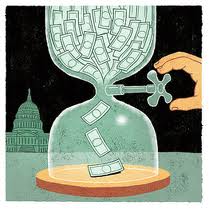 Perhaps the most important thing to do when you inherit an IRA is your homework. Start by finding out exactly the type of IRA you have inherited, and then find out what kind of beneficiary you are. USA Today's article, "If you inherit an IRA, make a plan before doing a thing," starts with the premise that the person inheriting the IRA is a surviving spouse, and outlines four options.
Perhaps the most important thing to do when you inherit an IRA is your homework. Start by finding out exactly the type of IRA you have inherited, and then find out what kind of beneficiary you are. USA Today's article, "If you inherit an IRA, make a plan before doing a thing," starts with the premise that the person inheriting the IRA is a surviving spouse, and outlines four options.
- Roll the inherited IRA assets into your own IRA. This has several advantages. The beneficiary can postpone required minimum distributions (RMDs) until age 70 ½, and beneficiaries can use their own life expectancy to calculate RMDs. Plus it's pretty easy. You don't have to keep both an inherited IRA and your own IRA, they can be combined, but the disadvantage is that the beneficiary will (with a few exceptions) have to pay a 10% penalty tax on pre-59 ½ distributions, and RMDs could be accelerated if the deceased spouse was younger than the surviving spouse.
- Transfer assets into a properly-titled inherited IRA. There are a few advantages to this. For starters, the spouse beneficiary won't have to pay the 10% penalty tax when taking withdrawals from an inherited IRA prior to age 59 ½. Also, you may be able to delay RMDs if the deceased spouse was younger. However, this is pretty complex. The beneficiary will have to keep their own retirement accounts separate from their inherited IRA.
 Houston Estate Planning and Elder Law Attorney Blog
Houston Estate Planning and Elder Law Attorney Blog









